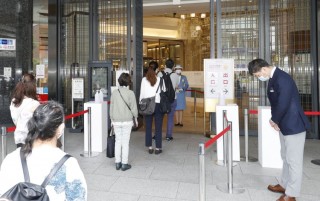Loading
Search
▼ Department Stores, Cinemas Reopen In Tokyo As Some Restrictions Eased
- Category:Other
Department stores, large cinemas and amusement parks in Tokyo and Osaka Prefecture reopened Tuesday as coronavirus restrictions on some businesses were partially eased under the extended state of emergency until June 20.
Such businesses had complained of a severe impact after being requested to close partly or fully in late April when the current virus emergency was first introduced.
The government of Prime Minister Yoshihide Suga set new guidelines for them when it extended the virus emergencies in nine prefectures last week, aiming to strike a balance between curbing coronavirus infections and reviving the battered economy.
Under the guidelines, department stores are permitted to operate fully on weekdays with shortened business hours while continuing to be limited on weekends to opening food halls and sections selling daily necessities.
In Osaka and Tokyo, all department stores run by Isetan Mitsukoshi Holdings Ltd and H2O Retailing Corp, the operator of the Hankyu and Hanshin department stores, fully resumed weekday operations Tuesday.
Universal Studios Japan in Osaka restarted business the same day for the first time since its closure on April 25 and people were waiting in line in front of its gates from two hours before opening.
The park will open only on weekdays and remain closed on we
ekends.
"I really want to enjoy USJ since it's been a while. I also want to pay attention to avoiding infection at the same time," said a 30-year-old woman from Osaka who was visiting the park with a friend.
The operator has capped the number of visitors at 5,000 per day and installed acrylic partitions between guest tables at restaurants in the park.
It will also ask visitors to leave the park at separate times to avoid concentrations of people.
The economic pain for restaurants and bars, however, is set to continue with restrictions such as a ban on serving alcohol staying in effect. A cap on attendance at sports events and concerts will also remain.
Currently, a state of emergency is in force in 10 prefectures in total, with the measure extended in nine of them, including Tokyo and Osaka, from the previous end date on Monday.
Okinawa Prefecture was the latest to come under the measure on May 23 and it was already set to last until June 20.
© KYODO
Such businesses had complained of a severe impact after being requested to close partly or fully in late April when the current virus emergency was first introduced.
The government of Prime Minister Yoshihide Suga set new guidelines for them when it extended the virus emergencies in nine prefectures last week, aiming to strike a balance between curbing coronavirus infections and reviving the battered economy.
Under the guidelines, department stores are permitted to operate fully on weekdays with shortened business hours while continuing to be limited on weekends to opening food halls and sections selling daily necessities.
In Osaka and Tokyo, all department stores run by Isetan Mitsukoshi Holdings Ltd and H2O Retailing Corp, the operator of the Hankyu and Hanshin department stores, fully resumed weekday operations Tuesday.
Universal Studios Japan in Osaka restarted business the same day for the first time since its closure on April 25 and people were waiting in line in front of its gates from two hours before opening.
The park will open only on weekdays and remain closed on we
ekends.
"I really want to enjoy USJ since it's been a while. I also want to pay attention to avoiding infection at the same time," said a 30-year-old woman from Osaka who was visiting the park with a friend.
The operator has capped the number of visitors at 5,000 per day and installed acrylic partitions between guest tables at restaurants in the park.
It will also ask visitors to leave the park at separate times to avoid concentrations of people.
The economic pain for restaurants and bars, however, is set to continue with restrictions such as a ban on serving alcohol staying in effect. A cap on attendance at sports events and concerts will also remain.
Currently, a state of emergency is in force in 10 prefectures in total, with the measure extended in nine of them, including Tokyo and Osaka, from the previous end date on Monday.
Okinawa Prefecture was the latest to come under the measure on May 23 and it was already set to last until June 20.
© KYODO
- June 2, 2021
- Comment (0)
- Trackback(0)


